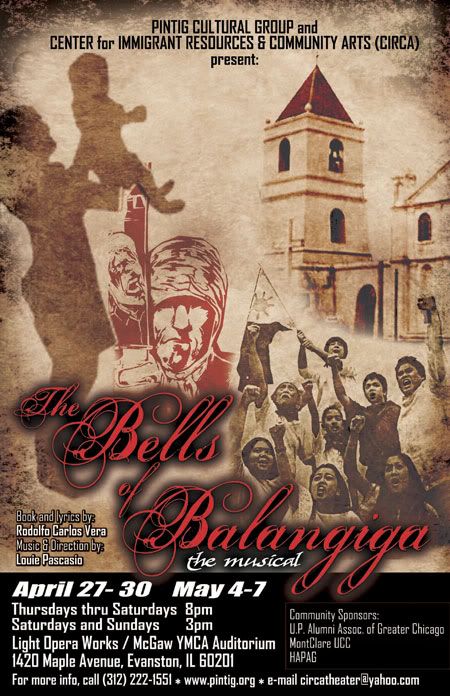
A century-old story sadly still current
After 15 years of successful dramaturgy, longtime Filipino theater troupe Pintig Cultural Group is remounting the musical, "Bells of Balangiga: The Musical," the story originating from the town of Balangiga, in the island province of Samar, east central Philippines. Playdates are April 27-30, and May 4-7, at the Light Opera Works, 1420 Maple Avenue in Evanston. For tickets, call 312-222-1551.
It is an event every Filipino, every person living in the United States, should not miss.
Balangiga is one of the southernmost towns in the province of Samar. A quiet Philippine province known for taking the first brunts of Pacific typhoons, Samar itself is historic because of Homonhon Island, the first island where Spanish explorer Ferdinand Magellan landed. How ironic that one of the first islands to be settled by Catholic Spain would also be one of the last symbolic sites of colonialism in the Philippines.
The play depicts Balangiga townsfolk fresh from the leaving of the last Spanish Catholic friar, and thus, the last symbol of colonialism in their town. When the U.S. soldiers landed on their shores, they immediately recognized a new colonizer, and determined to fight back using wits - until a resident girl is raped.
Whether the rape historically happened or not, residents still had cause to fight back using force. The U.S. soldiers had disrupted their way of life, often violently. Like the Spanish before them, residents met in secret and plotted their uprising. Needless to say, with only bolos, sharp knives and hands and punches, the residents fell heavily under gun and artillary fire.
The new colonizers, the Americans, took a Filipino town's most prized possession, the church's bells - a Spanish influence they had turned uniquely their own. Company C installed the bells in FE Warren Air Force Base in Cheyenne, Wyoming, where they remain today.
Groups in the Philippines and the U.S. say the soldiers took the bells as war booty. They and the Philippine government are lobbying for U.S. officials to return the bells to their rightful owners.
The play should be viewed in light of the larger history of the Spanish American War, and in turn the Filipino American War. "Bells of Balangiga" takes place in the middle of the former, when the United States had just entered the world stage and begun to follow patterns danced by former European colonizers, such as Spain, Portugal, England and France. One could see how unhappily history truly repeats itself, especially when this small incident, not even set in any big city such as Manila or Cebu, mirrors incidents in Afghanistan and Iraq.
From battles in Cuba and China, battle-weary U.S. soldiers came to Samar to follow President William McKinley's Manifest Destiny ideal already executed in the western U.S. against the Native Americans. They were burdened by homesickness and racism, and had been convinced of their superiority by a president inexperienced in imperialist sentiments.
McKinley's Manifest Destiny thinking is that U.S. expansion of their form of freedom and democracy is not only good, but it is obvious and inevitable, and divinely inspired.
"Bells of Balangiga," written by Rodolfo Carlos Vera and directed by Louie Pascasio, is an imporant reminder that not much has changed in over 100 years of U.S. thinking. In the 2004 Republican National Convention wherein President Geroge W. Bush accepted his second nomination for president of the U.S., he gave an address that could have been said in 1901, with resounding echoes:
"The progress we and our friends and allies seek in the broader Middle East will not come easily, or all at once. Yet Americans, of all people, should never be surprised by the power of liberty to transform lives and nations. That power brought settlers on perilous journeys, inspired colonies to rebellion, ended the sin of slavery, and set our nation against the tyrannies of the 20th century. We were honored to aid the rise of democracy in Germany and Japan and Nicaragua and Central Europe and the Baltics - and that noble story goes on. I believe that America is called to lead the cause of freedom in a new century. I believe that millions in the Middle East plead in silence for their liberty. I believe that given the chance, they will embrace the most honorable form of government ever devised by man. I believe all these things because freedom is not America's gift to the world, it is the almighty God's gift to every man and woman in this world."
That paragraph was taken verbatim from the White House Web site's collection of presidential speeches.
"Manifest Destiny is now unilateral preemptive strike, and [as in Spain] Christianity is now freedom," 1970s martial law activist Baltazar Pinguel said, during Pintig's 15th anniversary where the Bernard Stone documentary, "Two Bells/Two Worlds" was shown. He said that even the U.S. forgets - or worse, ignores - the lessons of history.
Balangiga is now a large municipality of 13 smaller barangays. The town plaza is surrounded by a playground, a stage, municipal buildings and city hall. Each September, residents and tourists gather around the plaza to participate in several days' festivities; the highlight is a reenactment by teenagers of the battle between their ancestors and the Americans. It is the town's largest tourist draw.
A basketball hoop stands in the middle of the plaza when it is quiet. One wonders what effect the bells would have on a simple fishing town like this, should the bells be returned. To a near corner stands St. Anthony Church, squat and elegant, painted a creamy white, its belltower whistling in the wind, waiting.
---
this piece was supposed to appear in the april issue of the fil-am community builder, but missed its deadline. oh wells. :-( it's ok. the editors said to tweak it for may. yay!






